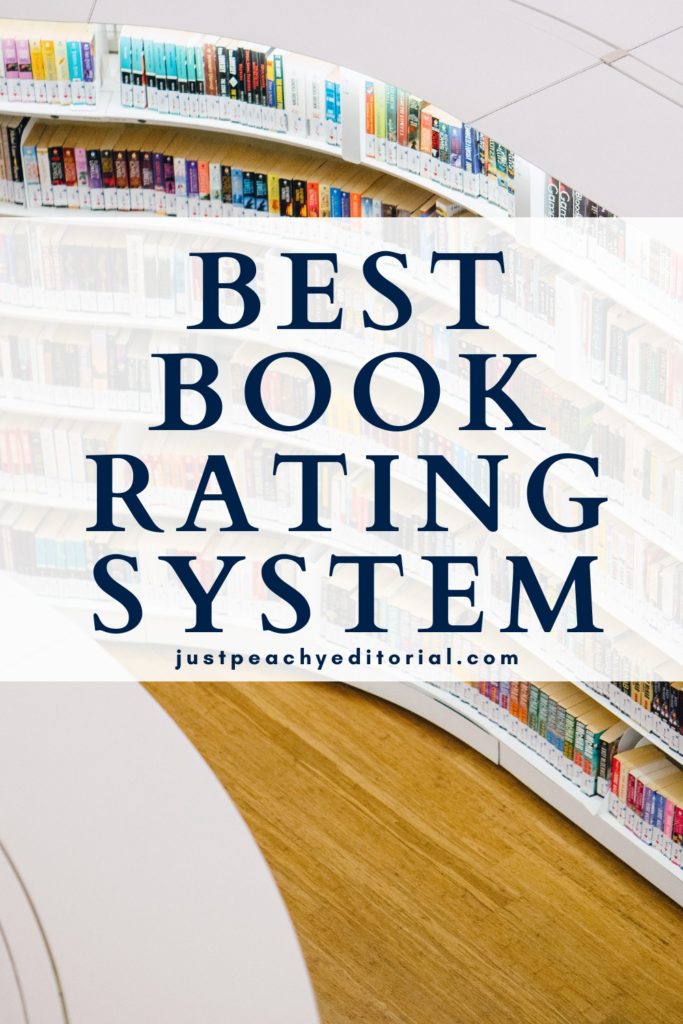You’ve just finished reading a book that made you feel some type of way – good or bad.
You want to share your thoughts and opinions with others, maybe give a recommendation or criticism.
But how do you decide what rating to give a book? What seems fair and logical?
“Did I enjoy it enough to make a five star? Was it lacking just a little to make it a four? Or maybe I feel like it was a three but that seems kind of low? I just don’t know.”
If you’ve ever had these kinds of thoughts, you aren’t alone, and this post is for you!
What you will learn:
- Why book ratings are so important
- Where the best places are to leave book ratings
- How books are typically rated
- How to rate books based on certain criteria
- My book rating system SPECS
I often find myself unable to decide how to rank a book. Sometimes I stress over it, and come back to it later only to think that maybe I’ve changed my mind about what I previously rated the book.
I wanted to create a better, more objective way to rank all the books I read.
I didn’t want it to be based on an emotional whim – from either my initial reactions or once that euphoria had worn off – or to let others’ opinions influence my own.
My rating system will give you the categories and criteria to rate books, in any genre, more effectively and with less stress.

Why are book ratings so important?
Book ratings matter to everyone involved in the industry.
Publishers rely on readers for feedback and to market their books.
Authors rely on ratings much in the same way as publishers.
And, of course, readers rely on ratings to decide whether or not to read a book, whether or not it will be something they will enjoy too.
We all love sharing our thoughts on books with others who enjoy the bookish lifestyle as much as we do.
Where to rate books?
There are many websites out there to rate and review books but these are by far the best:
GoodReads:
If you aren’t already on GoodReads, you definitely should be! This is THE number one place for books. It is user friendly and extremely popular. You can rate, review, create lists, and so much more. [I’m sure you already know this but if you don’t… seriously, go sign up for Goodreads, like right now ;)]
Amazon:
Ah, of course, good ol’ Amazon. If you didn’t already know, books are where Amazon got its start. When it was created, that was all they sold. So it’s no surprise that it is still one of the best places for book lovers (and I think it really needs no explanation).
Barnes & Noble (or Books-a-Million)
Obviously the most popular book retailers are going to make it on this list as well. Although, from my experience, their online presence isn’t as large as the first two on this list. But these are two more great places to leave ratings for books.

How are books rated?
Typically, books are rated on a five star scale, with one being the lowest score (or worst books) and five being the highest (or best books). But what do these five stars really mean, anyway? In general, this is how I use the 5-star rating system:
⭐⭐⭐⭐⭐
A 5-star book is one that I loved, an absolute must read, and now a favorite of mine. It’s a book that will live on my shelves forever and I would re-read in the future. The story has left a lasting impression on my heart and I would pick up anything else by this author without question.
⭐⭐⭐⭐
A 4-star book is one that I really liked. It’s a very enjoyable story, but just short of epic. Certain areas may not be as fulfilling as they could have been. I’m not quite as captivated or blown away, but still had a great experience. I’d recommend this book to others and continue reading from this author.
⭐⭐⭐
A 3-star book is good and worth reading. I enjoyed it but it felt a little lacking. I may recommend it to a certain audience. It gave me mixed feelings, possibly with potential it didn’t quite live up to. It’s a good experience, not amazing, but not bad.
⭐⭐
A 2-star book is just ok. It’s not a book for me and not one I would recommend. It didn’t hold my interest, and probably felt more of a chore to get through. Not completely terrible, but I didn’t have a good experience.
⭐
A 1-star book is one I just didn’t like, at all. Most likely I DNF’d it (did not finish). I would not recommend it to anyone and it is definitely not for me.
And while this system seems efficient, it can sometimes also feel unclear. Sometimes I agonize over deciding between star ratings.
I wanted a better rating system so that once I had stacked up a plethora of book ratings, they weren’t skewed in their comparison, but ranked equally and fairly.
No more wishy washy feelings.
I wanted something more concrete and decisive, that actually analyzed the content of the book.
So I created a simple but in-depth method.

My Ranking System:
I wanted a system that would work across the board for all types of genres, since I read all kinds of books. I didn’t want it to be too complex or niched. I decided on five categories that include the five essential elements of narrative for every story.
SPECS
S – Setting
This includes world-building, lore, atmosphere, etc.
P – Plot
This includes structure, arcs, pacing, climax, tension, resolution, hooks, etc.
E – Engagement
This includes immersion, enjoyment, themes, genre, tropes, etc.
C – Characters
This includes development, relatability, depth, dynamics, arcs, etc.
S – Style
This includes writing, voice, point of view, narrator, etc.
These “specs” are the categories and criteria I use to rate books. Each one is scored out of five, just like the typical five star system. Then you take those scores, add them together, and divide by five to get your overall score.
When you do the math, you may end up with a decimal figure. So here’s how I would round each score so that it matches up to the overall 5-star scale:
0 – 1.4 = 1 star book
1.5 – 2.4= 2 stars
2.5 – 3.4= 3 stars
3.5 – 4.4 = 4 stars
4.5 – 5 = 5 stars

Here’s an example:
Let’s say you decide on the following SPECS for a book.
Setting = 3
Plot = 4
Engagement = 4
Characters = 5
Style = 3
Add them together to get 19. Then divide by five to get 3.8.
So your overall rating for this book would be 4 stars.
As a reviewer, I want to give my audience the most authentic opinions possible.
I want readers to understand my reviews and know they can trust I have shared my perspective based on important criteria.
All book reviews are, in a way, subjective, because they are based on a single individual’s experience. Everyone is entitled to their own tastes, and we will not always all agree.
But the SPECS system is a method that will allow reviewers to base their feedback on evidence from these categories, rather than simply on an emotional response.
I hope that it will also help other reviewers who sometimes struggle like I do over choosing the rating that feels right.




As an Author, The Mildenhall Legacy, March 2022, I have received nothing below 5 stars from a certain age group (20 – 35). Professional reviewers have given the book 3.5 or above. I appreciate the fact that people of different age groups will have differing opinions about my work. That said, I like hearing (from the pros) where I can improve my writing skills!